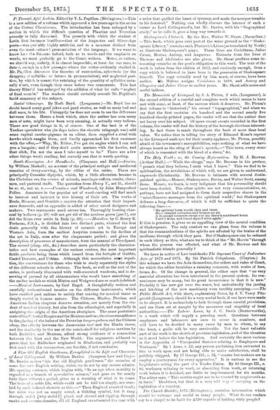The Holy Truth ; or, the Coming Reformation. By H.
J. Browne. (Arthur Hall.)—" While the clergy," says Mr. Browne in his preface, "preach what they believe, I state what I know." This wo find to be spiritualism, the revelations of which will, we are given to understand, supersede Christianity. Mr. Browne is intimate with several distin- guished spirits,—Homer, Shakespeare, Burns, and Walter Scott, among them. Homer•, wo learn, is very indignant that his personality should have been denied. The other spirits are not very communicative, or, perhaps, have not had assigned to them their respective shares in the "miscellaneous messages from the spiritual world ;" but Shakespeare delivers a long discourse, of which it will be sufficient to quote the following lines
My spiritual form would, then and there, Have inhaled confusion and brimstone air.
A thousand torments swept o'er my fancy's maddened brain Until I woke, and found myself alive again."
If this is genuine, it gives us an appalling view of the mental condition of Shakespeare. The only comfort we can glean from the volume Is that the communications of the spirits are affected by the brains of the mediums through which they pass. But if Shakespeare can be rednoed to such idiocy as this, what are we to think of the "Mr. Harris" through whom the process was effected, and what of Mr. Browne and his spiritualistic friends generally ?


































 Previous page
Previous page